- Home
- neetha Napew
The Web Page 2
The Web Read online
Page 2
sian or whatever—I don't even have the words for it. Maybe Paul would. But
the three of us—we've come this far together. And that means something."
Rourke checked the oxygen. The cowl flap switches were open. He set the
fuel selector valves to "main," the induction air system to "filtered."
Visually, he surveyed the circuit breakers and switches; there wasn't time
for a full check. He flipped the battery switch to "on."
Glancing at the main and auxiliary fuel indicators, he started throttling
open, the prop controls at low pitch. He adjusted the mixture
controls—full rich. He checked the auxiliary fuel pump; it was registering
high. He switched it off.
Glancing out the cockpit storm window again, he hit the magneto/start
switch.
"Paul—up here with a gun!"
Already, Rourke was exercising the props, watching the rpms build. He
throttled out, checked the magneto variances, throttled again. "Little
late to ask—the wheel chocks gone?"
"Yes." She smiled, laughing for an instant.
Rourke nodded, feathering the props, the mob less than a hundred yards
away now, the Chevy pickup closing fast. There was no glass in its
windshield, and men, packed in its truck bed, were firing rifles and
shotguns.
"Paul!"
"Right here."
Rourke glanced behind him; the younger man held Rourke's CAR- in his
right hand; his left was pushing the wire-rimmed glasses back from the
bridge of his nose.
"Put a few shots out the storm window," Rourke ordered. Then,
concentrating on getting airborne, he
ignored the mob. Trim tabs, flaps—he set them for takeoff.
He released the parking brake. "Let's get the hell out of here," Rourke
almost whispered.
"Brace )ourself Paul—and keep shooting." For the last ten seconds, pieces
of hot brass had pelted his neck and shoulders—Rubenstein firing the Colt
assault rifle toward the mob. The younger man stood almost directly behind
him.
Rourke glanced at the oil temperature, then rasped half to himself, "Full
throttle—God help us."
He checked the fuel altitude setting as he released the brake. The
aircraft was already accelerating. "Buckle up, Paul," Rourke ordered. More
of the hot brass pelted him, then suddenly stopped. Above the roaring of
the engines there were sounds now of gunfire from the field, of
projectiles pinging against the aircraft fuselage.
"What if they hit something?" Rubenstein called out.
"Then we maybe die," Rourke answered emotion-lessly. He checked his speed;
through the cockpit windshield the runway was blurring under him now. The
Chevy still came, gunfire pouring from it, the mob suddenly far behind.
The pickup was closing fast.
Rourke checked his speed—not quite airspeed yet. The far chain-link fence
at the end of the airfield was coming up—too fast. More gunfire; the
pilot's side window spiderwebbed beside Rourke's head as a bullet impacted
against the glass.
And Rubenstein was firing again as well, having ignored Rourke's
admonition to strap in. The Chevy swerved; one of the men in the truck bed
fell out onto the runway surface. The gunfire was heavier now, sparks
flying as Rubenstein's . slugs hammered against the pickup truck's
body.
"Hang on!" Rourke worked the throttles to maximum, starting to pull up on
the controls—a hundred yards, fifty yards, twenty-five yards, the nose
starting up. Rourke punched the landing-gear-retraction switch, and as
they cleared the fence top, the pelting of hot brass against his neck
subsided, Rubenstein's gunfire having ceased.
"Thank God." Rubenstein sighed.
"Hmmm." Rourke worked the controls, opening his cow] flaps, trying to
climb, gunfire still echoing from below and behind them.
He checked his airspeed—not good enough—then began playing the cowl flaps
and the fuel flow. The airspeed was rising. As Rourke banked the aircraft
hard to port, Natalia leaned half out of her seat, across his right
shoulder, Rubenstein to his left. The Chevy, now far below them, had
stopped. The men with rifles and shotguns in the pickup's bed were now
minuscule specks, more a curiosity than a threat.
"Can I breathe now?" Paul Rubenstein asked.
Smiling, Rourke checked the oxygen system on the control panel, then
nodded. "Yeah." Rourke decided to breathe, too. . . .
The controls vibrated under Rourke s hands as he sat a)one in the
cockpit. Natalia had gone ah with Paul, to help him resecure some of the
gear that had jarred loose during the overly rapid takeoff. The airfield
tower had given him the weather—generally good, moderate winds, perhaps a
few thunderheads, but at low elevations and unlikely to be encountered.
Rourke looked below the craft now, its shadow stark and black against the
empti-
ness that he saw. That expanse of wasteland had once been the Mississippi
Delta region. Now, like the rest of the Mississippi valley from where New
Orleans had been to its farthest extent north, the ground was a
radioactive desert.
The Night of the War . . . Rourke could not forget it, and at last
lighting the small dark tobacco cigar that he'd had clenched in his teeth
for nearly an hour, he thought more about it. The anger of the men and
women in the mob back at the airfield, even the reluctance of Reed to risk
an American life to save a Russian life, no matter how valuable, how
good—it had all started then, on the Night of the War.
The global fencing—the saber rattling—had ended long before anyone had
realized and the nuclear weapons had been unsheathed and ready. The death
... all of the death in that one night, millions of lives lost. The
pounding of nuclear weapons, which here, below him, had produced an
irradiated vastness that would be uninhabitable for perhaps as long as a
quarter-million years, had struck along the San Andreas fault line and
brought about the feared megaquakes—but far worse than anyone, save the
most wild speculator, had ever imagined. Much of California and the West
Coast had fallen into the sea—more millions of deaths. The Soviet Army—the
Soviet Union itself—was nearly as crippled as was what had been the United
States. The invading Soviet Army, headquartered in neutron-bombed Chicago,
had set up outposts in surviving major American cities and industrial and
agricultural regions, outposts that not only contended with the growing
wave of American resistance, but with the Brigand problem. Rourke felt a
smile cross his lips as he exhaled the gray smoke of his cigar. Some-
thing in common with the self-styled conquerors—the Brigand warfare, the
pillaging, the slaughters.
For it was after the war that both the best and worst of humanity had
risen to the fore. The best—Paul, certainly. The young Jewish New Yorker
had never ridden anything more challenging than a desk, never fought
anything tougher than an editorial deadline. Now, in the few short weeks
since the world had forever changed, Rubenstein had forever changed as<
br />
well. Tough, good with a gun, as at home on a motorcycle as he had been in
a desk chair. Even in the short period of time that had elapsed, Rourke
had noted the definition of his musculature, and the different set to the
eyes he continuously shielded behind wire-rimmed glasses. The wonder, the
excitement, were all there as they had been from the first with each new
challenge; but there was something else— a pride, a determination derived
just from having survived, from having fought, from having surmounted
obstacles. In those few short weeks, Rubenstein had grown to be the best
friend Rourke felt he had ever had— like a brother, Rourke thought,
feeling himself smile again. An only child, he had never been blessed with
a natural brother. But now at least he had one.
And Natalia—the magic of her eyes, the beauty that he would have felt
hopelessly inadequate to describe had the need arisen to do so. Rourke had
first met her before the war—a brief, chance meeting in Latin America when
she had worked with her now-dead husband, Vladmir Kara-mat sov. Rourke had
been a CIA covert operations officer; Karamatsov had been the same
thing—but for KGB, the Soviet Committee for State Security. And Natalia
had been Karamatsov's agent. Then, after the war, there was the staggering
coincidence of finding her,
dying, wandering the west Texas desert, herself the victim of Brigand
attack. The feelings that had grown between him and the Russian woman,
despite her loyalty to her country, despite her job in the KGB, despite
her uncle—General Varakov, who was the supreme Soviet commander for the
North American Army of Occupation. "Insane," he murmured to himself.
And then another chance meeting. Rourke had been pursuing the trail of his
wife, Sarah, and the children, lost to him on the Night of the War. Rourke
let out a deep breath, feeling the tendons in his neck tightening with the
thoughts. "Sarah," he heard himself whisper. The meeting—the meeting with
the girl named Sissy; the seismological research data she had carried
regarding the development of an artificial fault line during the bombing,
something that would reduplicate the horror of the megaquakes that had
destroyed the West Coast, but would instead now sever the Florida
peninsula from the mainland.
For all the destruction and the death, it had proven again that there
still remained some humanity, some commonality of species. For with
President Chambers of U.S. II and General Varakov, a Soviet-U.S. II truce
had been struck to effect the evacuation of peninsular Florida in the hope
of saving human lives.
The job finished, the truce had ended and a state of war existed once
again.
Rourke shook his head. War. Sarah had always labeled his study of
survivalism, his knowledge of weapons—all of it—as a preoccupation with
gloom and doom, a fascination with the unthinkable. It had torn at their
marriage, separated them, and now, despite the fact that they had promised
each other to try again for the sake of
Michael and Annie, for the sake of the love he and Sarah had always felt
for each other, it was war that had finally separated them.
Rourke remembered it; he hadn't wanted to leave, to give the lecture to be
delivered in Canada. Hypothermia—the effects of cold. The world situation
had been already tense; but Sarah had insisted, so she could get herself
together, to try again with him. It had been there, in Canada, that Rourke
had at last learned of the gravity of the situation rapidly developing
between the United States and the Soviet Union. He had been aboard an
aircraft nearly ready to land in Atlanta, near his farm in northeastern
Georgia, when he had heard over the pilot's PA system that the first
missiles had been launched. Then that night—the night that had lasted, it
seemed, forever, and nothing ever the same afterward.
He shivered from the memories: the crash after the plane had been diverted
westward, the struggle to survive afterward with the injured passengers,
the useless-ness of his skills as a doctor to the burn victims in
Albuquerque—then the slaughter of the passengers by the Brigands.
"Brigands," he murmured. He glanced at his watch; the black-faced Rolex
Submariner showed that he had been lost in his reverie for at least ten
minutes, perhaps longer. He checked the instruments, then the ground below
him—now a nuclear desert, a no man's land where once millions had lived,
worked, tilled the soil—nothing now. Not a living tree, or a blade of
grass that wasn't brown or black.
His cigar was gone from his teeth and he checked the ashtray, realizing
he'd extinguished it. Rourke shook his head, silent—tired. . . .
Reed started to stub out his cigarette, but didn't. Cigarettes were
getting harder to find. He kept smoking it, then looked up across the
littered table from his cup of coffee. "What, Corporal?"
"Captain, your pal, Dr. Rourke—he's gonna have trouble, sir."
"He had trouble—remember? Hell of a lot of good we were to stop it." He
looked back at the cigarette and noticed that the skin of his first and
second fingers was stained dark orange. Reed wondered what the stuff in
the cigarettes did to his lungs. He shrugged and took another drag; then
through a mouthful of smoke, he said, "What kind of trouble? He's got a
radio. We can contact him."
"A storm system—it just moved in, like it was out of nowhere, sir."
"He's a fine pilot. He'll fly over it," Reed answered, dismissing the
problem.
"But, Captain?"
Reed looked up at the red-haired young woman again. "What, Corporal?"
"You don't understand, sir," she insisted. "See. It's a massive winter
storm system—it was just there. You
know the weather's been crazy—"
"Winter storm system? Have you weather people ever figured out you can
learn a hell of a lot by just looking out the damn window?" Reed checked
his wrist watch, thinking of Rourke for an instant and envying Rourke the
Rolex he habitually wore. "An hour ago it was in the sixties—snowstorm?"
"Sir . . . please," the red-haired woman said.
"Yeah." He nodded, tired from going more than a day without sleep.
Standing slowly, he stubbed out the cigarette and looked around the
place—some officer's club, he thought. One lousy window. He walked across
the room, lurching a little because of sitting so long in one chair,
tired. He staggered against the back of a chair. A Marine lieutenant
started to his feet, saw Reed, then looked noncommittal. Reed shrugged it
off, reaching the window. "I need a good couple hours sleep, Corporal."
"Yes, sir." The red-haired woman nodded.
Reed pulled back the heavy curtain. Staring outside, he whispered, "Holy
shit!" He judged the depth, at least four inches of snow; a heavy wind was
blowing what had fallen back into the air. Drifts were mounting against
the tires of a jeep outside by the walkway.
"Yes, sir. That's it, sir," the red-haired woman echoed.
Reed looked at her. "It's impossible! It was like spring a few—"
<
br /> He looked back out the window. It was no longer like spring.
The sleet was coming in torrents now. Sarah huddled beside the children
under the overhang of rocks, a pine bracken to her right, as she stared
down into the valley. The pines made a natural windbreak for herself,
Michael, Annie, and the horses.
Across her lap, resting on her blue-jeaned thighs instead of the
children's heads, was the AR-—the one modified to fire fully
automatically when she put the selector at the right setting, the one
almost used to kill her the morning after the Night of the War, the one
she'd taken from the dead Brigand and used to shoot out the glass window
in the basement of her house in order to set off the confined natural gas
there after the gas lines had begun filling the house following the
bombing—to blow up her own home and the men inside it who had tried to
rob, to kill, to rape.
Priorities were odd, she thought, as she raised her left hand from Annie's
chest where it had rested and tugged the blue-and-white bandanna from her
own hair. Before the Night of the War—rape, it would have been a top
priority. But now losing things had somehow become unconsciously more
important as she considered life.
Rape would be a horror—but it could be overcome. Death—it might well be
more than expected. But to be robbed, deprived of food or horses or
weapons with which to fight—this was worse than death, and rape of the
spirit more foul than any rape of the body.
She looked to her right. Michael was sleeping, his body swathed—like
Annie's—in blankets against the bizarre and sudden cold. Michael would be
turning eight soon, and already he had murdered a man—a Brigand who had
tried to rape her.
She studied his face. It was John's face, but younger, though appearing no
less troubled. She could see the faint tracing of lines which in adulthood
would duplicate the lines in the face of his father. She could see the set
of his chin. She thought of his father's face, the quiet, the
resoluteness, the firmness. She found herself missing that—the steadiness

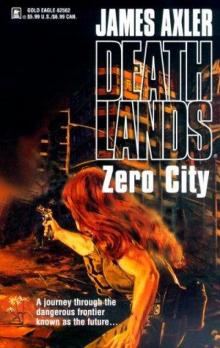 Zero City
Zero City Freedom Omnibus
Freedom Omnibus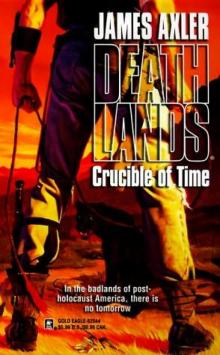 ACrucible of Time
ACrucible of Time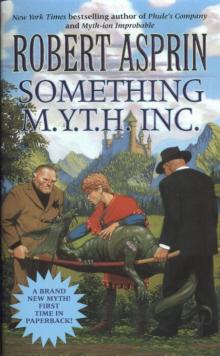 Something MYTH Inc
Something MYTH Inc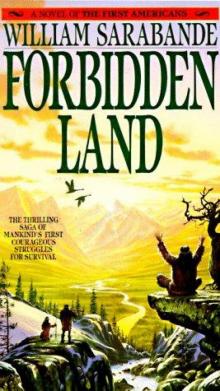 Forbidden Land
Forbidden Land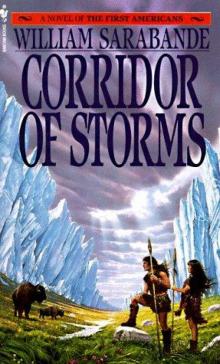 Corridor of Storms
Corridor of Storms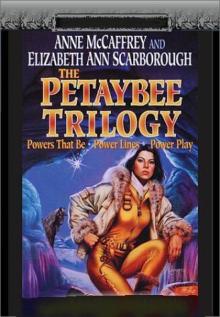 The Peytabee Omnibus
The Peytabee Omnibus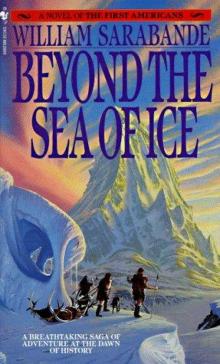 Beyond the Sea of Ice
Beyond the Sea of Ice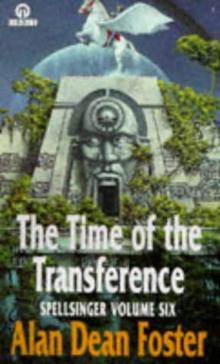 The Time Of The Transferance
The Time Of The Transferance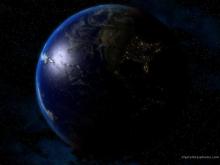 EarthBlood
EarthBlood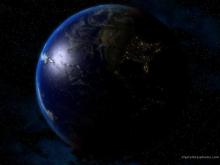 The Lexal Affair
The Lexal Affair The Web
The Web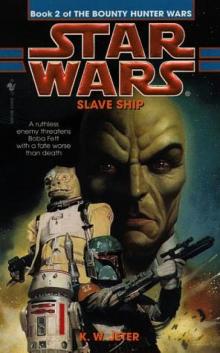 Slave Ship
Slave Ship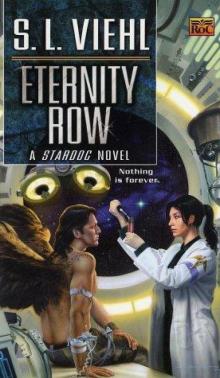 Eternity Row
Eternity Row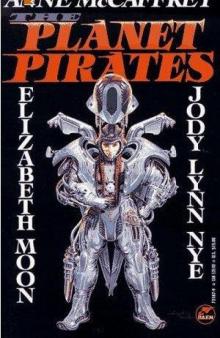 Planet Pirates Omnibus
Planet Pirates Omnibus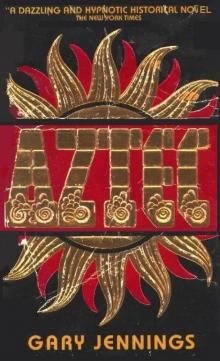 Aztec
Aztec The Awakening
The Awakening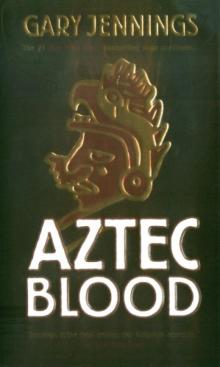 Aztec Blood
Aztec Blood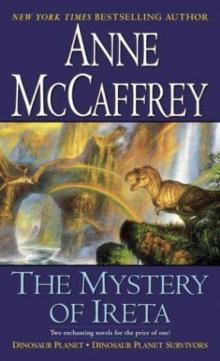 The Mystery of Ireta Omnibus
The Mystery of Ireta Omnibus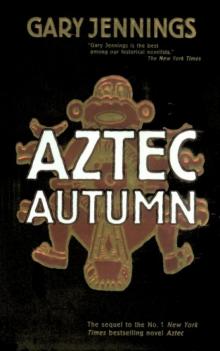 Aztec Autumn
Aztec Autumn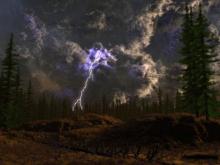 The Savage Horde
The Savage Horde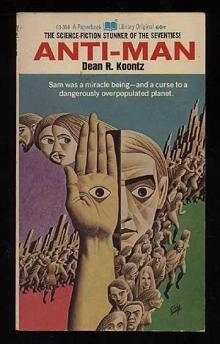 Anti - Man
Anti - Man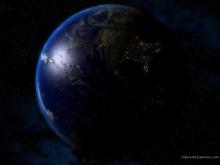 Deep Trek
Deep Trek Starfall
Starfall The Paths Of The Perambulator
The Paths Of The Perambulator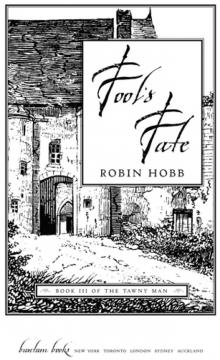 Fool's Fate
Fool's Fate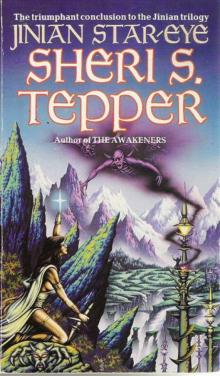 Jinian Stareye
Jinian Stareye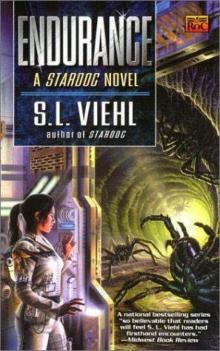 Endurance
Endurance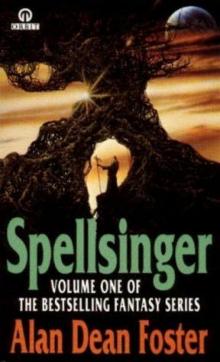 Spellsinger
Spellsinger Hybrids
Hybrids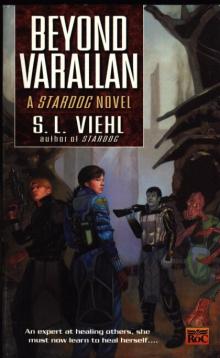 Beyond Varallan
Beyond Varallan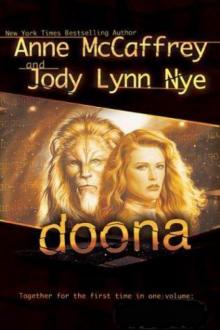 Doona Trilogy Omnibus
Doona Trilogy Omnibus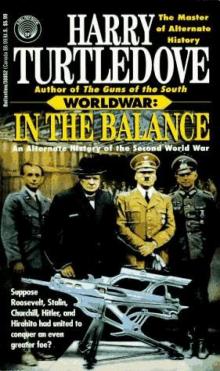 In th Balance
In th Balance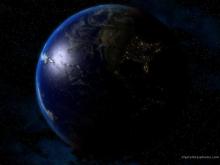 Planerbound
Planerbound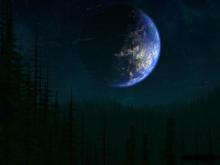 The Nightmare begins
The Nightmare begins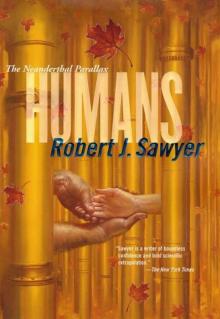 Humans
Humans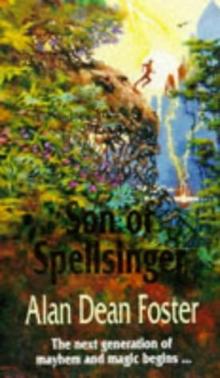 Son Of Spellsinger
Son Of Spellsinger